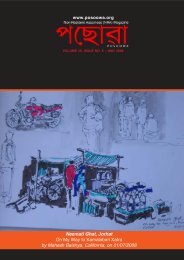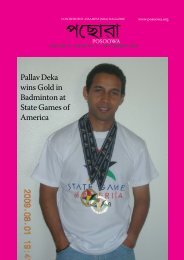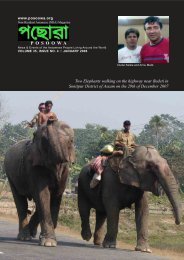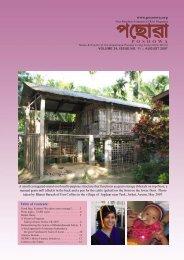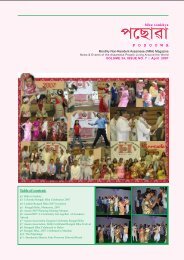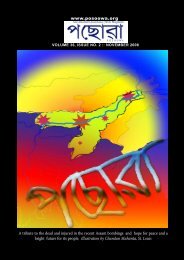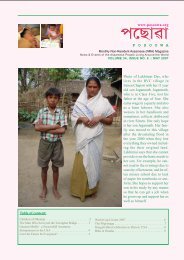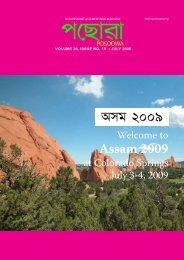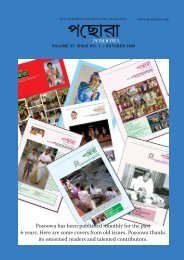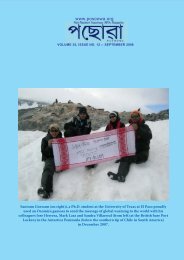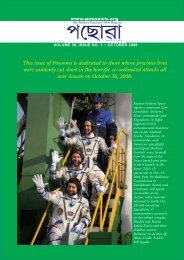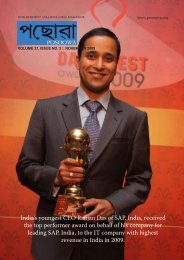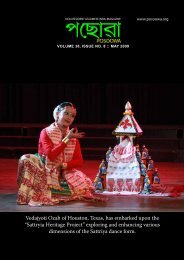Volume 35, Issue 6, March 2008 - Posoowa
Volume 35, Issue 6, March 2008 - Posoowa
Volume 35, Issue 6, March 2008 - Posoowa
You also want an ePaper? Increase the reach of your titles
YUMPU automatically turns print PDFs into web optimized ePapers that Google loves.
have to enter the grounds of the Satra<br />
bare-footed. That creates a practical<br />
problem of the pain of walking on<br />
small pebbles. As we walked we saw<br />
a man gathering firewood. We<br />
‘Bhokot’ preparing the rice for cooking<br />
stopped to say hello. What followed<br />
was display of unbelievable modesty<br />
and gentleness that humbled us. He<br />
offered to drop everything and show<br />
us around. We went to his living<br />
quarter that was built of bamboo and<br />
reeds and did not have a concrete<br />
floor. But it was immaculately clean<br />
Shree Shree Hem Chandra Deva<br />
Goswami, Satradhikar, Auniati Satra<br />
with an open fire. He had been at the<br />
Satra for more than 40 years since<br />
he was 9 years of age. His family was<br />
displaced by the floods and they did<br />
not have the resources to look after<br />
him.<br />
Thus he was taken in and there he<br />
remains till his “call comes”, as he<br />
put it. He insisted that we must have<br />
some tea that we declined and then<br />
he insisted that we should have Paan<br />
and betel nut. We then came across a<br />
boy of about 8 who was sweeping<br />
the grounds. Once again, he was the<br />
epitome of modesty and politeness.<br />
He had been there for about 18<br />
months and he appeared to be content<br />
with what the Satra had to offer.<br />
He was learning to dance (Satriya<br />
Dance). He was dedicated to the<br />
Satra by his parents at the age of 7<br />
and is visited by his family about<br />
once a year.<br />
We were guided to the main centre<br />
where the Satradhikar (the Head) received<br />
us with immense politeness<br />
and dignity. We learnt later that he is<br />
a highly qualified man who had a<br />
PhD. We then went around the large<br />
auditorium that holds cultural and<br />
religious functions like evening<br />
prayer, Raas Lila, Satriya dances and<br />
so on.<br />
Lesson 2: it costs nothing to treat others<br />
with dignity, politeness and respect<br />
and for peace of mind one does<br />
not need material comforts.<br />
The New Year eve party took the<br />
form of a singing contest dedicated<br />
to finding the “ Voice of Majuli”. It<br />
was entertaining. We were towards<br />
the backend of the auditorium. A<br />
group of local youngsters came towards<br />
us and asked, “Where do you<br />
come from” to which I said “ Bopai,<br />
Aami Dibrugarhar”. Profusely apologetic,<br />
they insisted on us sitting down<br />
in the front row. The heavy presence<br />
of security was quite daunting especially<br />
when the power supply got cut<br />
off.<br />
The New Years Eve dinner was a take<br />
away from the aforementioned “not<br />
very appetising place” but we were<br />
hungry and relished the fried fish.<br />
Sleeping under a mosquito net was a<br />
novelty experienced after many<br />
years. The lady of the house cooked<br />
the Luchi Bhajee breakfast the following<br />
morning. We planned to visit<br />
another Satra but the condition of the<br />
road deteriorated after a few<br />
kilometres from where we were stay-<br />
Page 5 * POSOOWA, <strong>March</strong> <strong>2008</strong><br />
ing and we abandoned the trip and<br />
headed for the boat to continue our<br />
quest for heritage – Bordowa that is<br />
the subject of part 2.<br />
What a remarkable and humbling experience<br />
– we said<br />
to one another on<br />
the boat.<br />
By Ranjit K Baruah<br />
Nottingham<br />
England<br />
Ranjit Baruah was born and brought<br />
up in Jorhat, Assam. He is one of 5<br />
children who started Balya Bhavan<br />
which was avant-garde in primary<br />
school education and was the first ever<br />
school in Assam that adopted the<br />
Montessory method. He went onto to<br />
graduate from Assam Medical College,<br />
Dibrugarh and then joined the<br />
Indian Armed Forces Medical Services<br />
for 4 years. After a short period of<br />
employment in the tea industry he<br />
came to the United Kingdom and went<br />
onto train in Psychiatry at Dumfries,<br />
Scotland and then at Canterbury and<br />
London in England. He was appointed<br />
a Consultant Psychiatrist in<br />
Nottingham in 1981 where he still lives<br />
with his wife. After holding several offices<br />
for the Royal College of Psychiatrists<br />
both locally and centrally in<br />
London he retired from active clinical<br />
practice as a Clinical Director,<br />
Rampton Hospital which is one of 3<br />
high security psychiatric hospitals in<br />
England being responsible for day today<br />
running of some 250 beds. Since<br />
retirement he and his wife have spent<br />
most of their time in travelling all over<br />
the world including regular trips to<br />
India.



